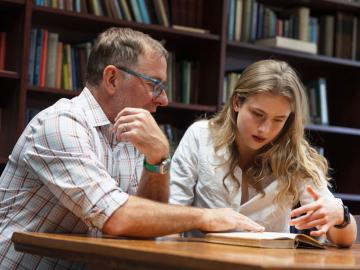Goldwater Scholarship Winner: Olivia Goldstein
April 10, 2020
Amanda Nagy

Olivia Goldstein is one of Oberlin’ s three recipients of the Goldwater Scholarship, a competitive award program that supports students in the natural sciences, engineering, and mathematics.
Out of the nearly 5,000 college sophomores and juniors who competed for the Goldwater Scholarship this year, Olivia Goldstein rose to the top of the applicant pool representing a discipline that only recently has been eligible for the scholarship program.
The Goldwater Scholarship is awarded to outstanding students pursuing research careers in the fields of the natural sciences, engineering, and mathematics. In 2019, the scholarship expanded to include nominations in the field of psychology for the first time in its 30-year history, says Nick Petzak, Oberlin’s director of fellowships and awards.
Goldstein is a third-year psychology major with a concentration in statistical modeling. She is among the 396 college students across the United States—and one of only 11 pursuing psychology—who will receive up to $7,500 for tuition and expenses in the 2020-2021 academic year.
Goldstein is a research assistant for Visiting Assistant Professor Kenneth Allen in the Cognitive, Affect, Self-Regulation, and Health (CASH) laboratory in the psychology department.
“We are interested in the relationship between mental illness and emotional response inhibition, which is essentially one’s ability to control their negative emotions,” says Goldstein, who is from Louisville, Kentucky.
“My primary research focus is on nonsuicidal self-injury, which is the deliberate infliction of bodily harm (most commonly cutting) without any intent to die. Nonsuicidal self-injury is one of the best predictors of future suicide, which is the second-leading cause of death in American adolescents and costs the United States approximately $69 billion per year. I hope that my research helps people, specifically children and teenagers, alleviate pain and experience better well-being and more happiness in their lives.”
Goldstein recently attended the Association for Behavioral and Cognitive Therapies in Atlanta, Georgia, to present the CASH laboratory study that examined how perceived criticism affects people’s decision-making abilities.
“Right now, I’m focusing on my independent research project to try to identify groups of people based on unique demographic and clinical characteristics who may be at increased risk for engaging in dangerous behaviors. The results could inform our knowledge about who is at risk and what behaviors clinicians should be looking for when trying to assess risk.”
Goldstein says this scholarship will help her stand out when applying to graduate programs.
“Clinical psychology graduate programs are notoriously competitive, so being one of the few psychology students in the country to have this award will help me stand out in a pool of really impressive, smart students,” she says.
Professor of Psychology Nancy Darling explains that psychology has always bridged the natural and social sciences, yet the popular idea of what psychologists do is very poorly mapped onto what psychology actually is.
“Advances in neuroscience have underscored and validated many earlier findings of research psychology,” Darling says. “It has also provided clear visible evidence of the strong connection between brain and behavior. These findings have led to a change in how psychological science is perceived, moving it more towards the STEM side of its roots. As neurological, biological, and biochemical approaches to understanding brain and behavior have gained prominence, the value of psychology’s traditional study of behavioral outcomes and its strong grounding in measurement and statistics ties much more into the Goldwater Foundation’s focus on STEM.”
In addition to her research, Goldstein works as a peer advisor for the Career Development Center and a student coordinator for the Office of Study Away. She is also a cohort leader for the Writers in Residence program, which mentors and supports teens in the Lorain County Juvenile Detention Home.
After Oberlin, Goldstein says her ultimate goal is to obtain a PhD in clinical psychology, focusing on child and adolescent psychopathology.
“I hope to advance suicide and violence prevention measures for children and teenagers who struggle with mental illness.”
Tags:
You may also like…
Oberlin Named Top Producer of Fulbright Students for 2024-25
February 25, 2025
Nineteen Oberlin College and Conservatory students and alumni were awarded Fulbright grants for the 2024-25 academic year, making the college the No. 1 producer of honorees among U.S. undergraduate-only institutions.
Historian Jennifer L. Morgan ’86 Wins MacArthur Fellowship
October 1, 2024
Specialist in early American slavery has earned acclaim for extensive research and writing on the subject.
Ava Harvey ’26 Earns Leadership Alliance Summer Research Fellowship
August 8, 2024
Ava Harvey ’26 received a Summer Research Early Identification Program (SR-EIP) Fellowship from the Leadership Alliance.


